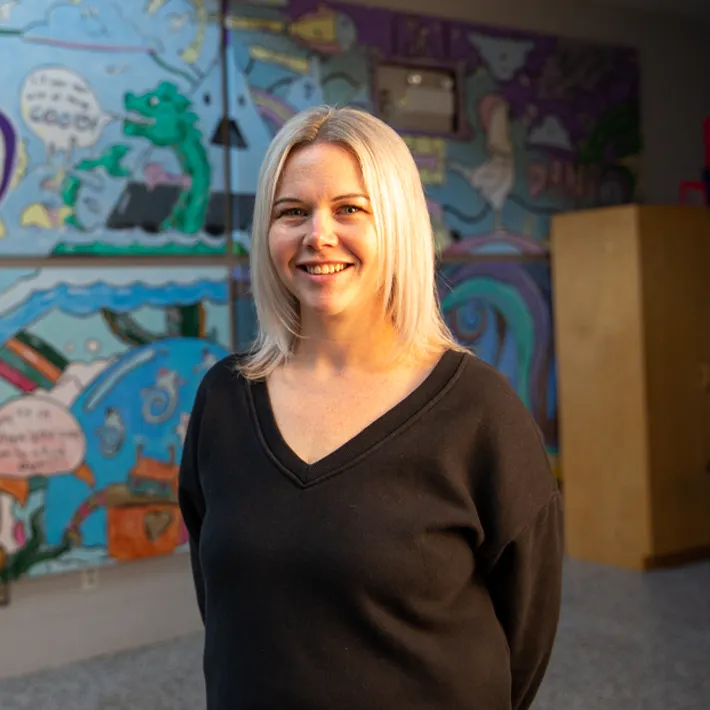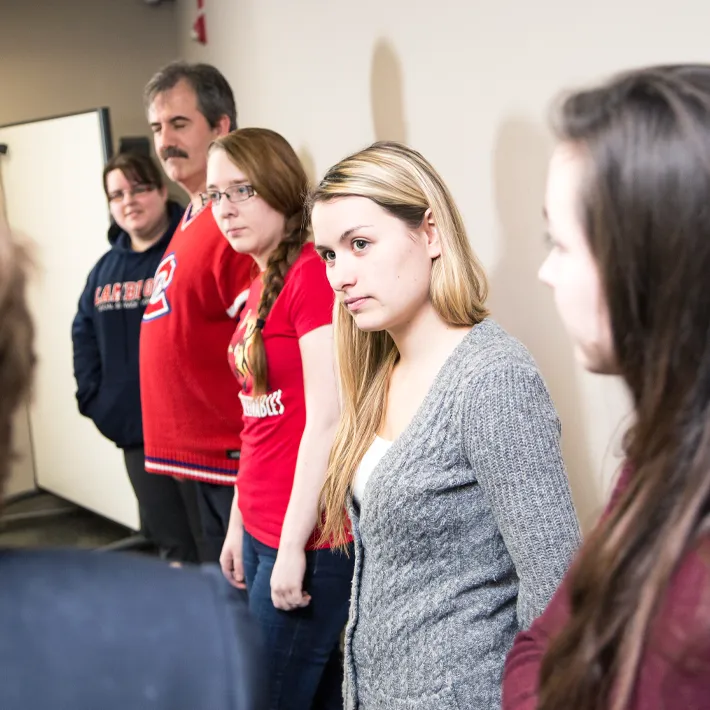

Child & Youth Care
Overview
Do you effectively regulate stress, present in a professional and dependable manner, have a passion to see young people succeed, and enjoy working closely with others to advocate for change? Then you might want to look at Child & Youth Care.
Students in the Child & Youth Care program prepare for a rewarding and challenging career where they will work for a variety of agencies and organizations concerned with the complex challenges of children, youth, and their families. The program focuses on giving students the skills to facilitate positive change, promote resiliency, independence, and self advocacy.
This program is dynamic and interactive and allows for students to practice core skills in a safe environment leading to feedback and assessments that are relevant and individualized. With over 1,500 hours of placement experience, capstone projects, community action and contribution plans, graduates can build robust resumes and ensure job readiness.
This program is ideally suited for emotionally mature individuals with a strong desire to help children and adolescents in a time of crisis.
Meet Kyle
Admission Requirements
O.S.S.D. or equivalent with:
- Grade 12 English C or U (minimum grade of 60%)
Mature Student Assessment for this program is available in the subject of English for the purpose of demonstrating proficiency in this required admission subject. For all other admission requirements, applicants must complete the required course(s) as listed above. For more information, please contact counselling@lambtoncollege.ca. Review the Mature Student Admission process.
Academic admission requirements can be obtained through Academic Upgrading and the Pre-Programs at Lambton College.
Placement Story: Big Brothers - Big Sisters of Sarnia-Lambton

Placements in our Community
Over the years, Lambton College has developed a strong relationship with the Big Brothers Big Sisters of Sarnia-Lambton. This partnership creates a number of placement opportunities for Lambton College students and it allows the community to access a number of programs that wouldn't exist without this collaboration.
- 15 - 20 students placed in field placements or internships each year
- Representing the Child & Youth Care, Social Service Worker, and Office Administration programs
Costs
- Year 1 $4,156.71
- Year 2 $4,066.68
- Year 3 $4,066.68
Please Note: These fees apply to the 2025-2026 academic year and are subject to change. Fees do not include books (unless specifically noted), supplies or living costs.
Technology Requirements
In order to keep pace with the requirements of each and every course in your program, Lambton College requires that each student have access to a laptop while studying at our college.
Courses
Introduction to Field Placement
This course prepares the student for the first field placement that occurs in the second semester. Students experience a forum for discussion of recurring issues related to the field placement experience. These recurring issues are explored through lectures, class discussions, and presentations by guest speakers from the Child and Youth Care field. Students identify their strengths and areas for growth in preparation for their second term field placement. Guidance and direction is provided for students to assist in the selection of their first field experience.
Introduction to Child & Youth Care
This course introduces students to the profession of child and youth care - examining historical developments as well as assisting the student in acquiring a body of knowledge and skill which are unique to child and youth care. The course focuses on three central themes: i) the children, youth, and families served; ii) the role of the Child & Youth Care Practitioner; and iii) self-awareness
Critical Analysis of Self
This course will explore diverse concepts and models of wellness and will assist learners in developing tools and resources to manage personal and professional stressors. Through personal inventory, the learner will explore, reflect on and critically analyze their strengths, needs, and gaps to support them in understanding their personal and professional capacity. The concepts and activities in this course will assist the learner in unpacking and placing themselves in their social location, understanding their personal biases and recognizing their privilege.
Critical Thinking & Writing
This writing course challenges students to explore diverse opinions and articulate their own perspectives clearly and persuasively. Through critical reading, students will develop skills in synthesis, analysis, comparison, and response, striving for clarity and diplomatic expression of their opinions based on factual evidence. Students will practice various rhetorical strategies of persuasion and hone their writing to ensure precision and accuracy in their messages. This course lays the foundation for a subsequent research-writing course, equipping students with essential skills for academic success.
Psychology 1
This course provides a foundational overview of psychology, exploring the biological and cognitive processes that underlie human behaviour and experience. Students are required to purchase the assigned textbook to be successful in the course.
General Education Elective
Field Seminar 1
This is the first of five seminars related to the field practicum. This seminar and the following seminars will be offered concurrently with field placement. Field Seminar is a forum for first-year students to integrate placement experiences with classroom learning. Common and recurring issues related to the student's field placement experience will be identified and prioritized for discussion.
Field Work 1
Field practice is the forum for observing, identifying, practicing and incorporating skills and theory taught in the classroom. Each field experience combines with the student's specific learning needs and the placement's requirements to offer a practical learning opportunity for the student.
Child & Youth Care Methodology 1
In this course, learners will be introduced to the methods used in creating and maintaining a therapeutic milieu, with a specific focus on self-awareness. As many students enter this field for personal reasons and with personal histories that reflect an interest in the ways that children and youth can benefit from the intervention of trained professionals, it is important that students understand their own styles of interacting.
Therapeutic Activities
This course is designed to investigate the objectives of play and programming with children and youth using a relational approach. The focus is on the psychological insight that play is an essential element of life. In organized play, skills, and processes are learned which later enable individuals to relate to their community and society. Throughout this course learners will enhance their ability to facilitate activities with children and youths that are strength-based, engaging, meaningful, and therapeutic.
Legislation & Social Issues
In this course the student will become familiar with all the relevant legislation and regulations related to the practice of Child and Youth Care such as the Child, Youth and Family Services Act and Youth Criminal Justice Act. Pertinent pieces of legislation will be raised and discussed as the student learns about the laws that govern intervention with children, adolescents and families. The needs and rights of children, adolescents and families will be reviewed within the framework of existing and proposed legislation. This course will provide the student with an opportunity to identify recurring social issues and identify what is being and/or needs to be done to resolve these issues.
Communications for Community Services
This course enhances students' research and communication skills in preparation for work in community services. Through the theme of "advocacy and education," students gather, analyze, and respond to recent and relevant research in their field, creating research reports and research presentations to share with their peers. The research process provides students with the opportunity to develop their writing skills through critical thinking, analysis, synthesis, application, and evaluation. These skills are necessary for success in current and future college courses, the workplace, and students' personal lives.
Field Seminar 2
This is the second of five seminars related to the field practicum. This seminar and the following seminars are taught concurrently with field placement. Field Seminar is a forum for second-year students to integrate placement experiences with classroom learning. Common and recurring issues related to the student's field placement experience are identified and prioritized for discussion.
Field Work 2
This course provides the student with experience in working with children, adolescents, and/or families. The student is exposed to the experience of working as a team member in a community setting and has a primary goal of integrating theory and practical experience.
Therapeutic Foundations
This course provides students with a basic understanding of counseling theories and techniques specifically those that are used when working with children and youth. The counseling process when engaging children and youth, and selected theoretical models, are examined in detail.
Interviewing & Counselling
This course examines the nature of the helping interview as a vehicle for understanding people and their problems. The primary focus is on adapting interviewing and counselling skills to various practice settings. Role playing and interview simulations provide opportunities for students to develop and practice their skills in the classroom.
Group Work
This course is designed to increase the students' knowledge and skill in the areas of group dynamics, group intervention, group conflict, and group leadership. The student will examine their relational practice in groups and provide feedback to others while developing their group work skills. The student will develop a needs based group work proposal, and create therapeutic, goal driven, evidence informed interventions that meet the needs of the target population. The importance of evaluating the effectiveness of the group work experience will be explored.
General Education Elective
Human Growth & Development
Using a developmental psychology lens this course focuses on providing students with an opportunity to improve understanding of development and self in the context of global community. Students will examine the human lifespan from infancy to old age, across physical, cognitive, social and personality contexts. Foundational theories, socio-cultural and historical context, as well as an examination of current issues within Canada, provide the learner with opportunities for critical thinking and a better understanding of the influences on their own development and self-awareness. Applied learning assignments provide learners with the opportunity to demonstrate learning while also adding to their co-curricular record. Global partnership, diversity and equity, epigenetic change, and transgenerational impact are recurring themes throughout.
Field Seminar 3
This course focuses on developing the child and youth care practitioner's skills in problem solving, intervention, programming, and best practice. Emphasis is on identifying problems that are conducive to change, establishment of goals, case management, and evaluation techniques. The helping processes of joining, relating, talking, interpreting, and life-space interventions will be developed and practiced. Experiential learning will occur.
Field Work 3
This course provides the student with experience in working with children, adolescents, and/or families. The student is exposed to the experience of working as a team member in a community setting and has a primary goal of integrating theory and practical experience.
Child & Youth Care Methodology 2
This course examines the psychodynamics of children and youth in need of help and the complex factors involved. Opportunity to develop therapeutic, observation, and assessment skills in relation to children and youths' behaviour, as it relates to the process of change, is provided.
Family Process
This course introduces the student to the developmental stages that a family experiences during its lifetime. A family systems approaches will be used to explore the stages of the family with attention being placed on the changes in family systems in Canada. Understanding the family in relation to the larger social fabric will be explored. In addition, the student will examine themselves in relation to their family experiences.
Adolescent Development
In this course the student will begin the process of developing an informed professional perspective regarding the nature of adolescence development. This course will utilize a biopsychosocial approach while exploring developmental issues, developmental theories and key influences including peers, family and culture. Child and Youth Care Practitioners are responsible for supporting and intervening with adolescents in a variety of settings. It is essential that CYC's are aware of and understand the range of both normal and deviant adolescent behaviours.
Assessments & Clinical Documentation
This course will examine the use of assessment instruments and recording tools used by various human service organizations. Why agencies keep records and how records are created, monitored, updated, and stored will be reviewed. Various assessment tools will be studied as a process for gathering information to understand problem behaviours and situations, and to develop professional, effective, and supportive service plans.
Psychology 2
This course introduces students to key areas of psychology related to lifespan development, personality, motivation and emotion, social influence, as well as psychological disorders and treatments. Students will gain a broad understanding of how these factors influence human behaviour and mental processes. Students are required to purchase the assigned textbook to be successful in the course.
Field Seminar 4
This is the fourth of five seminars related to the field practicum. This seminar and the following seminars take place concurrently with field placement. Field Seminar is a forum for third-year students to integrate placement experiences with classroom learning. Common and recurring issues related to the student's field placement experience are identified and prioritized for discussion.
Field Work 4
This course provides the student with experience in working with children, adolescents, and/or families. The students assume a higher degree of responsibility involving decision-making, assessment and crisis intervention. In addition, the student is exposed to the experience of working as a team member in a community setting.
Child & Youth Care Methodology 3
This course focuses on developing the child and youth care practitioner's skills in problem solving, intervention, programming, and best practice. Emphasis is on identifying problems that are conducive to change, establishment of goals, case management, and evaluation techniques. The helping processes of joining, relating, talking, interpreting, and life-space interventions will be developed and practiced. Experiential learning will occur.
Working with Families
The Working with Families course builds on the knowledge obtained in CYC 4023 - Family Process. A systematic approach is used as a basis for understanding the origins of troubled families and the need for interventions to promote a more functional family environment. The learner reviews current legislation and continues to develop a relational perspective and framework to working with children and their families. The student examines local community-based CYC intervention strategies, and analyzes their current placement's approach to working with children and their families.
Violence, Abuse & Trauma
This course examines the issues and concerns associated with violence and abuse in society. The student gains an understanding of how children, youth, and their families are affected by violence and trauma. Focus is placed on examining physical, sexual, and emotional abuse of children and adolescents from a familial and larger systemic perspective. Partner abuse and violence in society are also examined. Treatment needs of the abused and the abusive will be explored. Also, the importance of advocacy work will be explored. An anti-oppression perspective will be utilized in order to focus on the issues of power imbalance, and resulting forms of abusive behaviour.
General Education Elective
Field Seminar 5
This is the fifth and final seminar related to the field practicum. This seminar is offered concurrently with field placement. Field Seminar is a forum for third-year students to integrate placement experiences with classroom learning. Common and recurring issues related to the student's field placement experience will be identified and prioritized for discussion.
Field Work 5
This course provides the student with experience in working with children, adolescents, and/or families. The students assume a higher degree of responsibility involving decision-making, assessment and crisis intervention. In addition, the student is exposed to the experience of working as a team member in a community setting.
Culture & Human Diversity in CYC Practice
This course will assist students in exploring diverse populations in our society and the impact of social identity, location, and privilege in working with children, youth and families. It is intended to help students grow in their thinking and awareness of critical concepts of self and others. CYCPs value self-inquiry, self-reflection and self-awareness as essential components of professional practice. Students will explore historical, current societal, as well as personal biases, and develop strategies to respectfully practice/promote sensitivity to the needs of diverse populations.
Organizational Behaviour & Clinical Supervision
This course acquaints the learner with the organizational structure, governance and behaviour of a typical social service agency. It investigates leadership and management decision making process which influence the behaviour of individuals and groups. Administrative duties involved in a variety of CYC based settings, including the supervisory process, staff performance appraisals, leadership issues, accountability and professional development are emphasized.
Understanding Addictions & Concurrent Disorders
The purpose of this course is to examine addiction and problem gambling as well as mental health problems in the practice of Concurrent Disorders. Incidence, trends and prevalence of addictions, problem gambling and mental illnesses along with assessment and treatment practices are explored. Key issues and challenges related to treatment for co-occurring mental health and addiction problems including interactions of mental health medications and substance abuse will be identified. Students will be encouraged to surface their own assumptions and biases and deepen their appreciation of how concurrent disorders affect people's lives and familiarize themselves with current best practices.
Contact
School of Fire Science, Health & Community Services
Program Information
After Graduation
Employment Opportunities

Our graduates have found rewarding work opportunities in the following areas:
- Community-based child and youth development programs
- Parent education and family support
- School-based programs
- Open and closed custody group homes
- In-patient and out-patient treatment programs
- Youth shelters
- Central point of access programs
- Youth justice
- Early intervention and prevention programs
- Child protection agencies
Accreditations & Certifications
Ontario Association of Child & Youth Care
Graduates are eligible for full membership and certification with the Ontario Association of Child & Youth Care and the Council of Canadian Child & Youth Care Associations. This membership promotes accountability to sound ethical practice, ongoing professional development, and relevant provincial legislation and policy in Ontario.
Child & Youth Care Practitioner Certification
Upon graduation students will also be eligible to write the Child & Youth Care Certification Board exam and complete the process for international Child & Youth Care Practitioner certification which will enhance opportunities for alumni to practice globally.
Pathways
Build on your education and complete a college diploma or university degree in Ontario, Canada, or abroad
Want to see more Ontario transfers? Visit ONTransfer.ca.
Placement
Placement Requirements
Vaccinations & Police Record Checks
Students considering this program should be aware that there may be field and clinical placement requirements. Many placements require students have proof of certain vaccinations and police record checks.
Travelling to Placement
Many agencies that provide field placement opportunities are outside the areas that public transit serves. Having a valid driver's license and access to a vehicle is an asset for field placement.
Where to Find Program-Specific Requirements
Once you’ve applied, you can log in to mylambton.ca and view the program-specific Field & Clinical Placement Requirements. If you need information about these requirement before applying, please contact placementinfo@lambtoncollege.ca.
Unique Placement Features

- Community Action & Contribution Plan
- Our community action and capstone project challenges and develops key employability skills and competencies. Lab simulations assist student in gaining perspectives on the nuances, tone, and nature of their work. The Contribution Plan Project gives students the opportunity to research and develop innovative ideas that allow them to create their own job upon graduation.
- Local Placements
- Our local placement agency network and stakeholders take active roles in assisting students to reach their vocational goals. Workshops and certifications can often be accessed during students' placement hours allowing them to build additional qualifications that promote future employment. Project-based placements are also available allowing students to impact children, youth, and families through research projects, proposals, and enhanced programming.
More Information
Skill Demands
Students are required to demonstrate excellent written and oral communication skills. They should also be able to establish rapport with children or youth while in the program. Students will be expected to demonstrate excellent team work skills.
Some students with disabilities may require academic accommodations to equalize opportunities to meet the academic demands of this program or the courses within it.
Technology Requirements
It is recommended that you use a Windows laptop for your coursework. While other devices like MacBooks or Chromebooks might work for some tasks, they may not support all the software required for your program. If you're unsure, check with your professors before buying.
Internet Speed Requirements
To get the best experience while learning online, we recommend having an internet connection with at least 40 Mbps download speed and 10 Mbps upload speed. This will help you use video calls, attend online lectures, and access other learning tools smoothly.
Because students live in many different areas, we can't suggest a specific internet provider. You'll need to check with local companies to find one that works best for you.
Laptop Requirements
In order to access the internet and virtually-delivered software and courseware, student laptops should include the following at a minimum. By meeting the following specifications, students will be equipped to access software and courseware on their laptop through the internet:
- Intel i5 8th Gen Processor or equivalent
- 8GB of RAM
- 100 GB HDD or more
- Webcam with a microphone
- Wi-Fi capable (802.11n/ac 5GHz)
- Windows 11 operating system
Mobile Device
Students will require a mobile device (smartphone) for:
- Accessing your digital student ID
- Using campus applications and services
Software
To ensure students are getting the most our of their classroom experience, some software will be required.
Lambton College has made this software easily accessible online. Students can leverage our Microsoft Office 365 software packages and services. In addition, much of the software you require for your courses will be available on demand for use on any device - on or off campus.